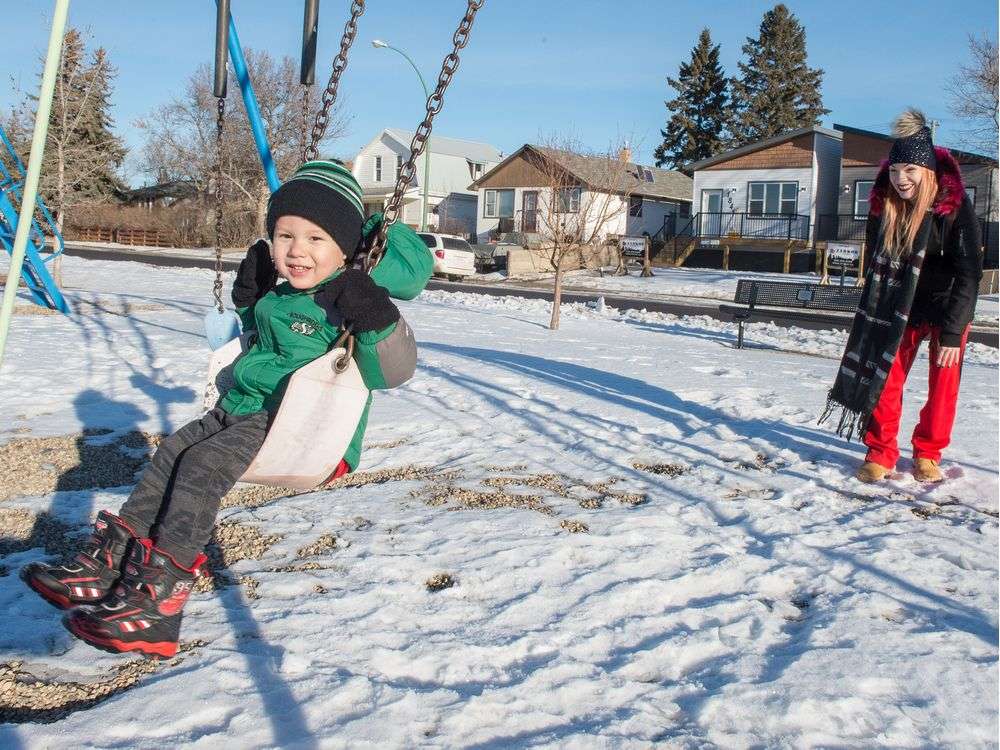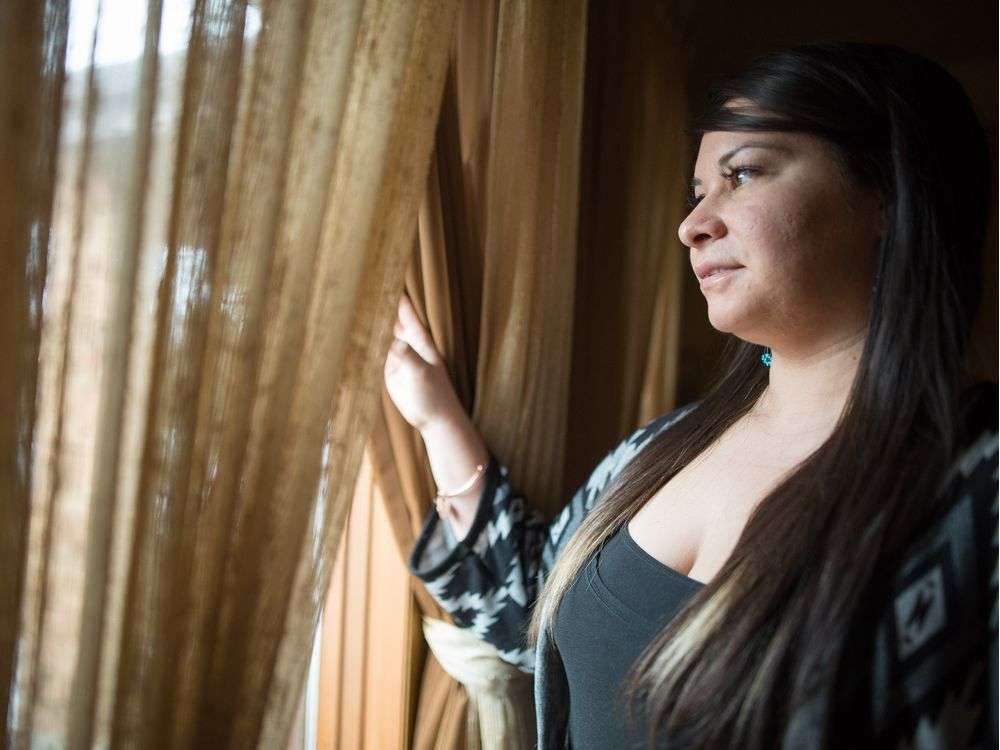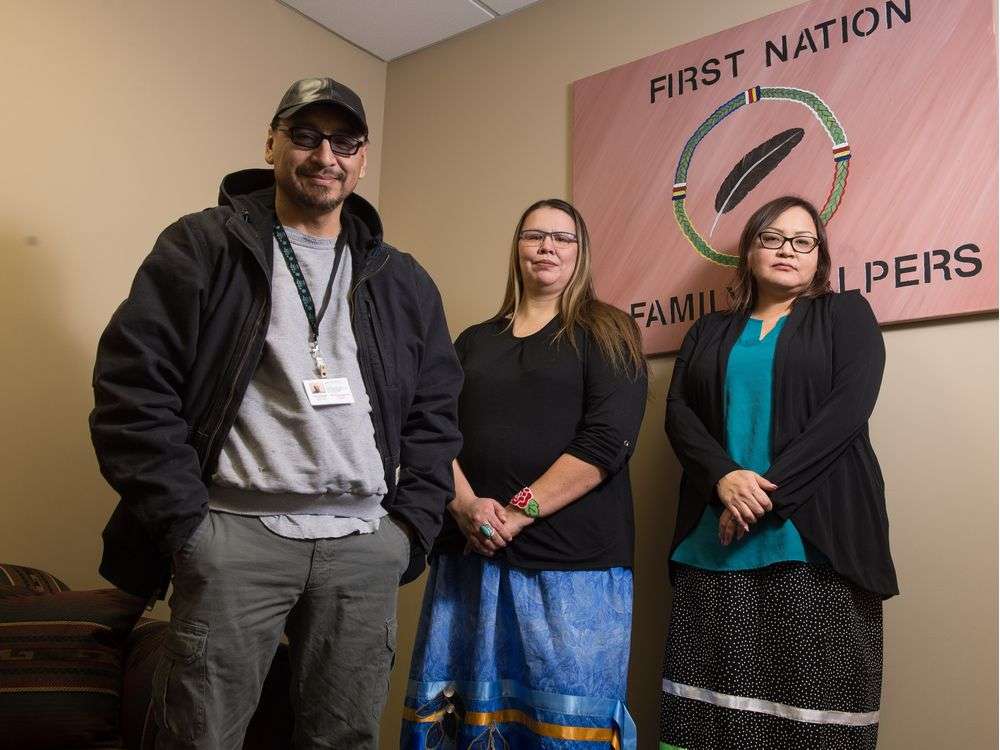
‘I want to get clean’
Support group tries to pull Sask. addicts from grasp of crystal meth
“I’m tired of being high and I’m tired of my family looking at me like I’m the drug addict.”
Jasmine Clarkson walked down the stairs, wrapped a cord around her neck and forced herself not to think about what she was about to do.
She was an addict in the throes of an emotional tailspin that left her feeling like she had nothing and no one.
Perched on a speaker with the cord on her neck, she was one step away from dying.
Clarkson thought, “I’m a crappy mom and I’m an addict and my family doesn’t care about me and my boyfriend doesn’t care about me. What’s the point?”
Then she took what she thought was her final step.
“I instantly blacked out and went straight to a dream,” said Clarkson. “I was standing in a room and all these people were talking and they all stopped and looked at me and screamed, ‘Wake up!’ ”
She woke gasping for air, the cord around her neck, her hair tangled in the cord and her boyfriend Josh holding her by her legs screaming for her to wake up.
“If it hadn’t been for Josh coming downstairs, getting that feeling like something was wrong … I wouldn’t be here,” she said.
In and out of treatment since 2014, it took her near-death experience for Clarkson to decide she wanted a new life.

She found her way to Crystal Clear, a new support group for crystal meth addicts held every Wednesday night at the Mamaweyatitan Centre in Regina.
“I’m tired of being high and I’m tired of my family looking at me like I’m the drug addict,” she said, now 25 years old. “I want to get clean.”
At the time she spoke to the Leader-Post in mid-December, Clarkson had been clean for about three months.
Four years earlier, she had chosen a different path, when she found crystal meth, a highly addictive drug that police say is driving crime across the province.
Clarkson was 21 when she snorted her first line.
After getting into a serious car crash when she was pregnant with her son, separating from her son’s father and struggling with anxiety and depression, Clarkson hit her limit.
Not able to handle everything after her son was born, she gave him to her mother to look after for a while.

“It started out with just partying and then one day my friends were just like, ‘Hey, do you want to try it?’ and I was all for it,” Clarkson said. “I got into it and I got into it pretty heavy.”
Soon she was doing it every day, whether it was smoking or doing hot rails (inhaling vaporized crystal meth).
She lost everything, including her apartment, after spending her rent money on drugs and her boyfriend became abusive.
“I was starting to feel like everyone was pushing me away,” said Clarkson.
The group has become a place she can go and talk about her experiences without fear of judgment, something she feels she can’t do with her family.
“It helps a bunch,” said Clarkson. “I’m not alone trying to be sober. I have people who are listening (and) understand.”
Filling what they saw as a gap in supports and services for people addicted to crystal meth, the Yorkton Tribal Council’s (YTC) Child and Family Services (CFS) in Regina created the Crystal Clear support group.
Launched in September after months of research and planning, the group follows a process similar to the 12 steps of the Alcoholics Anonymous (AA) program.
“This is giving them a safe place to come and meet other people who are in recovery,” said Rae Shingoose, program manager for Member Nations Services of YTC CFS in Regina.
“A person can’t get off crystal meth on their own,” she said. “They need the support.”
Garry Severight, a child and family support worker for YTC CFS in Regina, leads the group every Wednesday.
Before starting up Crystal Clear, organizers said they did a lot of research into crystal meth and the effects it has on the body and the brain.
Clients who had tried supports like Narcotics Anonymous or AA said they didn’t quite work for people addicted to crystal meth because the experiences are so different, said Severight.
Experience with his own sister’s crystal meth addiction helps him relate and create a space of mutual understanding for those who come to the group to share their stories.
“It’s just such an awful drug. It traumatized her children, her behaviour — diving behind couches and extreme paranoia,” he said. “It traumatized them seeing their mother … like that.”
Paranoia is one of the many side effects of crystal meth and even though she’s been clean for over 12 years, Tiffany Newby can recall those moments like they were yesterday.
“I would hear voices and stuff like that outside my house, think people were saying my name. I would see shadow people. I would have feelings that somebody was in my back seat when I was driving,” she said.
Newby also attends the weekly group, but in more of a mentorship role. She said helping others hold on to hope is her way of making up for the harm she caused while addicted.
“I used. I drank. I kind of screwed my family over and everybody that was around me,” she said.
She began using crystal meth around age 15. She did everything from smoking and snorting it to eating it.
She said being on crystal meth made it feel like her body was aging or deteriorating rapidly. Her body ached, she was covered in open sores, she had chest pains and lost an extreme amount of weight.
It took a year or two for her body to start feeling normal again after getting clean.
Now 32 years old, she reflects on the moment that made her turn her life around.

Around the same time she had been arrested for an armed robbery and was sentenced to house arrest, Newby learned her mother had terminal cancer.
“I realized I hit rock bottom and my mom was going to go and I didn’t want her remembering me that way,” she said. “I didn’t want me as a drug addict to be the legacy that my mom left behind because her whole goal in life was to be a good mom.”
Never really getting the chance to “redeem herself” before her mother died, she said it’s hard to listen to the parents who come to the support group to talk through the pain and worry of having a child with a crystal meth addiction.
“I’m trying to go through the process of forgiving myself for all that stuff,” said Newby.
Her message today is “just don’t do it.”
“It will ruin your whole entire life,” she said. “It wrecks you in every way.”
The side effects of crystal meth range from mood and behavioural to physical and psychological.
Euphoria, depression, social isolation, impulsiveness violence, open sores and hallucinations are just a few in a long list of symptoms.
Clarkson has experienced many of them.
Day one of a crystal meth binge induced a feeling like she could do anything, but day three or four brought on hallucinations of shadows and people walking and talking that weren’t there.
She would often hear whispering.
“There’s even times where I’ve been so high I actually flipped out on people because I thought they were whispering about me,” she said.
“It’s reached the point where every time I get high I’m completely sick the entire time I’m high,” said Clarkson. “I just can’t handle it no more. It makes my body ache. I’m sick for days on end. I can’t eat.”
She was more than ready to get clean and happy to start going to a support group where she can share her stories and hear from others about how they got through their dark times.
“It’s a sort of comfort just because I feel like I can’t go to my family or anything like that,” said Clarkson. “They can’t see past the drug addict persona.”
But at the support group, there’s no judgment and she’s beginning to work through all the issues that led her to drugs in the first place.
Since it began, Shingoose said the popularity of the group has grown — increasing from four at the first meeting in September, to a maximum capacity of 15 by early December.
Both Shingoose and Severight said the group is important for people who need more immediate support while they wait to get into detox or a treatment centre.

As program manager, Shingoose has aspirations to grow the program to reach more people in need. They are looking to add a second support group on Saturday nights, something they’ve asked Newby if she’d like to lead.
One day, they hope to offer a group every night of the week to help make it accessible for everyone regardless of their schedule.
Shingoose said they are also looking for sponsors to help guide members through the 12-step program and are asking anyone in long-term recovery to contact them if they are interested in getting involved.
The launch of a support group called Stand Up specifically for families of addicts is also in the works.
“It’s to let families know you’re not alone out there,” she said, adding they must remember three important things when trying to help a loved one addicted to crystal meth.
“You can’t control it. You can’t change it and you can’t cure it,” said Shingoose. “What you can do is support them, increase your knowledge, increase your awareness and be there for them when they’re ready.”
In addition to supporting addicts in recovery, the program aims to spread education and awareness about crystal meth, its effects and the recovery process.
“It requires a unique recovery process than other drugs,” said Severight. “It’s more intense. It has to be more consistent and more supportive.”
They also hope to partner with the Regina Public School Division and Regina Catholic SchoolDivision to do a mass awareness campaign for the city’s youth.
“These individuals who are in recovery that we’ve spoken to, they said, ‘If only someone told me how bad crystal meth was … I would have said, ‘Hell no!’ ‘ ” said Shingoose.
YTC CFS would also like to partner with provincial addiction and mental health services to help improve services for people addicted and afflicted by crystal meth.
For Newby, the new life she’s built for herself is what keeps her on the straight and narrow. She’s currently working part time at KFC and part time as her grandfather’s caregiver.
In January she starts a new chapter in her life — nursing school.
Clarkson is just beginning her journey.
Although legally still in her custody, Clarkson’s son Jeremiah — who is now five years old — is still living with her mother. She says it’s hard to be apart, but it’s for the best for now.
“I think it’s only the better choice that he is with a stable person because I am clearly not fully stable yet. It’s not right yet for him to be with me,” she said. “It has put lots of strain on our relationship, but I make sure every day he knows I love him.”
She hopes to one day have her son back with her full time and rebuild trust with her family. Until then, she’s working on getting a job and getting her life together — living life for herself and no one else.
By talking openly about her story, she hopes she can help others learn from her mistakes.
“It’s not just like weed where you can pick it up and then not do it again for however long,” said Clarkson.
“It grabs you and it grabs you hard.”
The Crystal Clear support group is anonymous and takes place at the Mamaweyatitan Centre (3365 6th Avenue) from 7 p.m. to 8 p.m. every Wednesday night.
It is part of the Crystal Clear Support Program, which offers one-on-one addiction support, addiction awareness facilitation, outreach/sponsorship and group support.
For more information call YTC Child & Family Services Inc. at 306-337-1200.
Source : leaderpost

